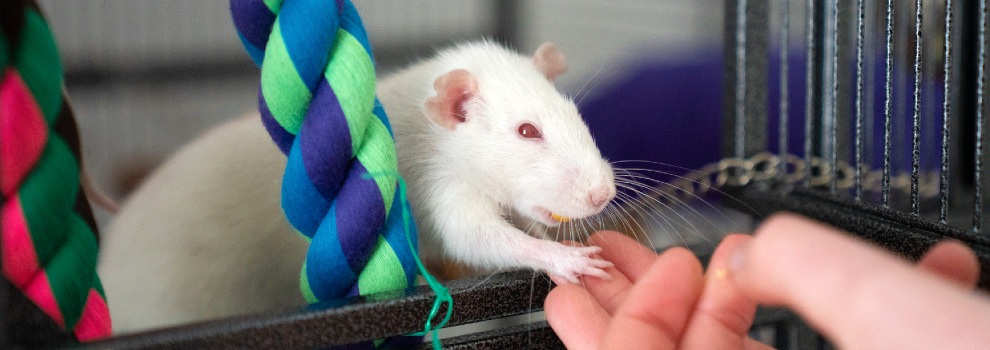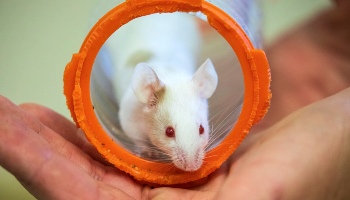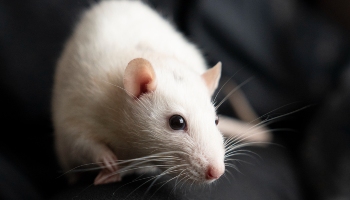They will need:
- To rest/sleep without being disturbed - rats are nocturnal, so are most active at night, dawn and dusk. Keep feeding times, cage cleaning and interactions to these times wherever possible, and match your activity with that of your rats – don't house them in areas that have lots of activity during the day so they can rest undisturbed.
- Opportunities to climb - give them ropes in their cage to help develop their sense of balance. Rats will chew ropes as well as climb them, so they should be made of natural fibres (such as cotton) and replaced when necessary.
- Opportunities to run, forage, explore and play - rats are active, highly intelligent and like playing, especially when they're young. To keep them engaged, be creative with their enrichment and rotate toys regularly.
- Opportunities to explore - once they're well-handled and relaxed, consider letting your rats explore outside their cage, in a room where they can't hurt themselves or escape (make sure you keep an eye on them!).
- Opportunities to dig tunnels and create burrows - rats love digging!
- Water to play with - if your rats enjoy playing with water, give them the opportunity to swim in a shallow container, safely and with you keeping an eye on them. Never make them swim if they don't want to.
Free-ranging behaviour
Once your rats are well-handled and relaxed, consider allowing them time for supervised ‘free-ranging’ behaviour. You can do this by letting them explore outside of their cage in an area where they can’t hurt themselves or escape. Choose a room that you are happy to be explored by your rats. Remember, rats will chew, gnaw and scent mark.
Alternatively, provide a large exercise pen with lots of objects for the rat to explore, and space for them to run, climb, hop and play, including providing them with a digging area, water bath and foraging tray.
Always supervise free-ranging behaviour. This will not only form a close bond between you and your rat, but will also prevent the rat from escaping or coming to harm. Remember any area you use should be designed to encourage the natural behaviours described above.
Digging behaviour
Make sure that you give your rats the chance to dig. Allow your rats access to an area where they can dig, outside of their cage, whilst being supervised. For example, provide a box containing digging material such as clean sand or compost.
You should also encourage digging behaviour in their home-cage by giving them a thick layer of suitable bedding material.
Rats and swimming
Some, but not all, rats can enjoy the opportunity to swim. Never force your rats to swim: rats find forced swimming highly stressful.
If your rats enjoy playing with water, provide your rats with the opportunity to swim in a safe and supervised way. Water provided for swimming must be at room temperature.
The water bath must always be shallow (for example a shallow tray of water) and designed to allow the rats to get in and out easily when they want to. Never place your rats directly into water; your rats must have free choice to decide to go in and out of the water themselves.
Only provide your rats with access to a water bath as part of supervised ‘free-ranging’ (that is, outside the home-cage) behaviour, not as part of their home-cage. Never leave your rats with access to a water-bath without supervision.
Rats and their whiskers
Never trim your rats’ whiskers. They are delicate and more sensitive than human fingertips. Rats brush these long hairs against objects or the floor, helping them build up a detailed picture of their surroundings and guide them around their environment, as well as to balance. This is essential for animals who are active in the dark and with poor vision.
Damage to their whiskers is a considerable welfare concern, as it deprives the rat of one of their ways of moving about and exploring their environment. For this reason rats and other rodents should never be placed in exercise balls – they restrict their ability to explore and make judgements about the environment, resulting in high levels of stress.
Treating your rat with kindness
Rats need choice, so never force them to do anything. Allow them to check out new surroundings at their own pace, as they're naturally cautious. If they urinate or defecate when they're in a new place, it means they're frightened or distressed – if this happens, return them to their familiar home-cage. Rats do urine-mark, but this differs from urination in volume and frequency. Different rats behave differently in similar situations, as they each have different personalities and may have been reared differently.
Rats are quick learners, highly trainable, very clever, curious and have excellent memories. They need mental stimulation to stop them getting bored, so consider training them. This can help you bond with your rat, as well as keeping them physically and mentally active. Rats can learn new information and tasks, and remember them over time. Train them to climb onto scales to gain a food reward, as this can make regular weighing much easier. Never punish them – always use positive reinforcement to encourage training.
Rat fact: rats are intelligent
Giant African pouched rats have been trained to detect tuberculosis in humans and help fight wildlife crime by sniffing out the scales of the pangolin, thought to be the most poached animal in the world. They've also been trained to sniff out explosives and have safely located thousands of landmines in Tanzania, Mozambique, Angola and Cambodia so they can be removed.
Not only that, but rats can count to 10. They can also be trained using positive reward-based methods to do things like respond to their own names, give 'high-fives', fetch a ball and roll over. It's a great way to give your pets an enriching and rewarding experience, and improve your bond with them.




